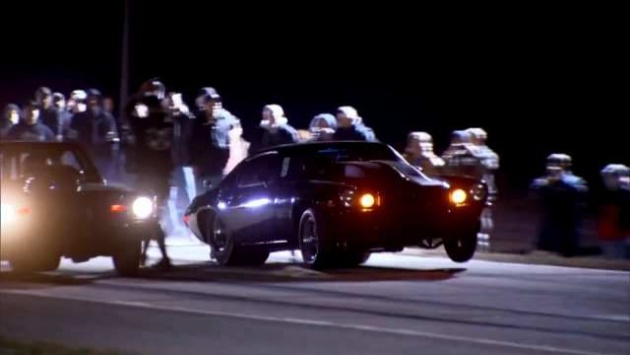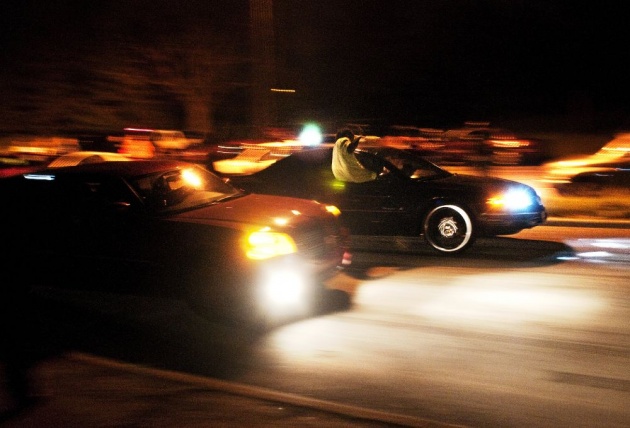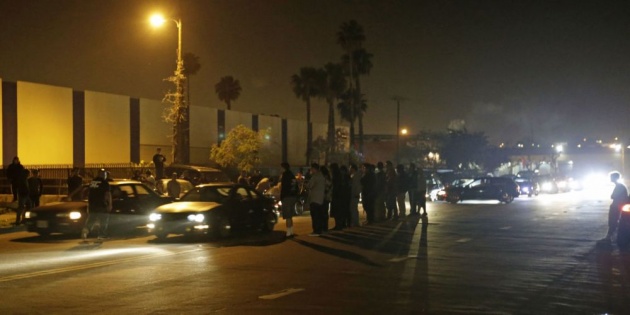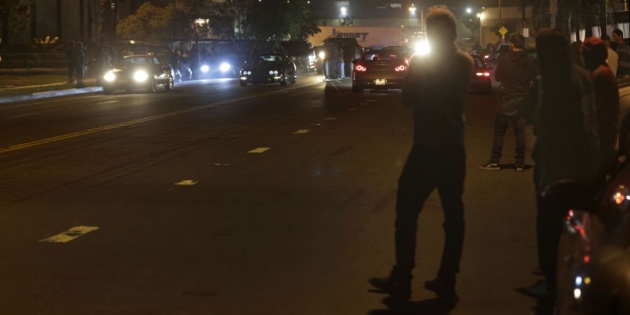Thirteen years ago this past April, I stood by the finish line of the last formal street race I'd ever witness. It was long past midnight, at an industrial park in the middle of Midwestern nowhere. We'd come to the place in groups of two and three cars, driving our outrageous and under-muffled Supras and 240SXes and Bimmers as quietly as we could. Beneath a flickering streetlamp, at the end of a service drive, two young men discussed the "spot" (head start, in street race parlance - ed.) that one of them would receive and the cash terms of the wager. A neutral third party who would serve as the starter got in one of the cars. It was not an attractive female; this was Ohio reality, not Hollywood fantasy. My friends and I gathered at the end of the impromptu dragstrip and watched the taillights of the two cars shrink until they disappeared and were replaced by distant pairs of white rectangles.
There was a shriek as both cars leapt from the starting line, a sort of quacking as the Mustang on my side of the road ingested its "100 shot" of nitrous, then a loud bang, followed by the unsteady idle of an overboosted Volkswagen turbo engine that had fallen into "limp mode." Assured of his victory, the Mustang driver eased off the gas. It was perhaps twenty seconds later, not the fabled ten or less, when the two cars rolled over the finish. Bored by the whole thing, I hopped back in my 330i and drove home. Just as well; half an hour later, the police arrived and arrested most of the crew for trespassing.

My timely departure reinforced the suspicion among some of the local street racers that I was a snitch, and had I returned to the industrial park some other night I might have had some trouble as a result. As fate would have it, though, I was engaged in something worse than snitching, at least from the perspective of the Midnight Club types. I was in the process of converting street racers to real racers, one driver at a time. Some time before, I'd made the acquaintance of one of the scene's most infamous "40 rollers," a Supra Turbo driver who boasted over six hundred horsepower at the rear wheel and could drop Suzuki GSX-Rs in the freeway races that started at 40 MPH and ended when all but one of the participants lost heart. He was tired of the scene, tired of the people, tired of the risk. Most of all, he was convinced that something terrible would eventually happen that would make all of us wanted criminals.

So we announced our intentions on an invitation-only message board frequented by the area's most devoted illegal racers. Anybody who was tired of "the game" could join us instead. We offered a rotating schedule of legitimate motorsports activities, from competing in SCCA en masse to attending the US Grand Prix. We even rented out a racetrack for our exclusive use a few times. Fourteen people quit street racing and joined us. Over the years, some of us went as far as Grand-Am racing and others were content to attend the occasional open-lapping session, but none of us returned to the street. My friend and I were proud that sixteen of us had "gone legit." We tried not to think about the hundreds of drivers we left behind.
This is what most people in the automotive hobby are unwilling, or unable, to admit: You cannot kill street racing. You can't even discourage it. Not entirely. As long as young men (and it is overwhelmingly young men) can get their hands on a vehicle of some type, there is going to be illegal racing. It happened when the Stanley Steamer was the hottest thing on the road and it will be happening long after you need a doctorate in Computer Science to disable the speed limiter on your electric transportation pod. There were teenagers racing buggies through the streets of London back when the horse was the only way to pull them.
Every year, thousands of street racers realize that the risk to themselves and to innocent bystanders like the four people killed in the Raleigh area this week exceeds the rewards of being the first car across some hastily-painted line a quarter-mile away. So they walk away, and are in turn replaced by thousands of young people who have managed to figure out where the action is in their hometowns. Maybe they watched a movie that glorifies street racing. Maybe they have friends who do it. Or maybe they are simply listening to a voice within that tells them to go out and see what you're made of. That voice, too, is older than the automobile by a long shot.

As an activity, street racing has little going for it. If you stick with it long enough, you'll wind up dead or in jail. The fabled high-dollar street races of movies and television don't really exist. You can't make money as a street racer any more reliably than you can make it as a player of nickel slots. But it offers things that money can't really buy. The exhilaration of absolute victory in front of an admiring crowd. The sense of belonging you get when you conduct your business with a select group of like-minded people in secret. A belief that here, at last, you have found yourself and defined yourself the way you always thought you would when you were six years old, that you have become the outlaw hero of your own fantasies. That you are, as the man once said, not your job, not your apartment, not your possessions.
You can't discourage young street racers who are addicted to that adrenaline rush without offering them something just as good in return. That's why when I look at the roster of entrants at any local NASA race I see plenty of names that used to be found on reckless-operation tickets five, ten, or twenty years ago. It's why I talked up the joys of legal competition at every street-race I ever attended. But not everyone will listen. So we have to be satisfied with small victories. Each name on an autocross entry list is one less name that you'll see in an arrest report.
A few years after I watched that late-night race in the industrial park, one of the members of my old underground club lost control of his GTO in a 40-roll. The crash killed a family heading the other way. He lived. Lived to face the charges. To become a pariah among his friends and loved ones. To sit in prison and read about the lives he'd taken. And I'd like to tell you that the secret message boards and midnight meets stopped the day after the crash occurred. But that would be a lie. Which is why I still find myself out in the parking lots on the occasional Saturday night, telling my story to young drivers. I can't stop street racing, but I can slow it down.




